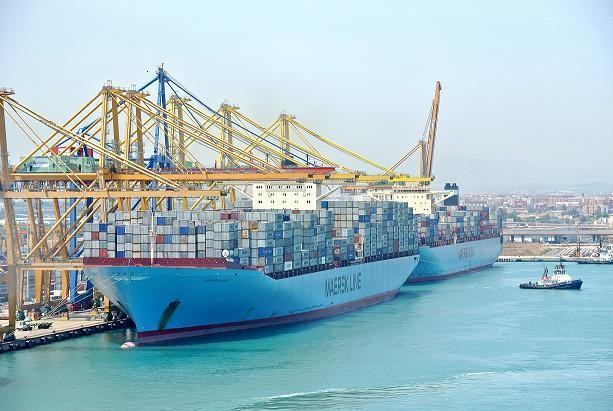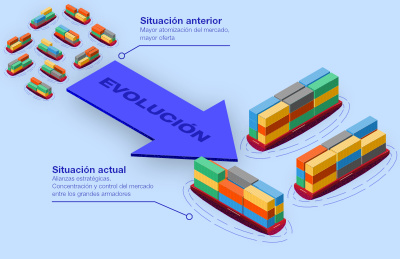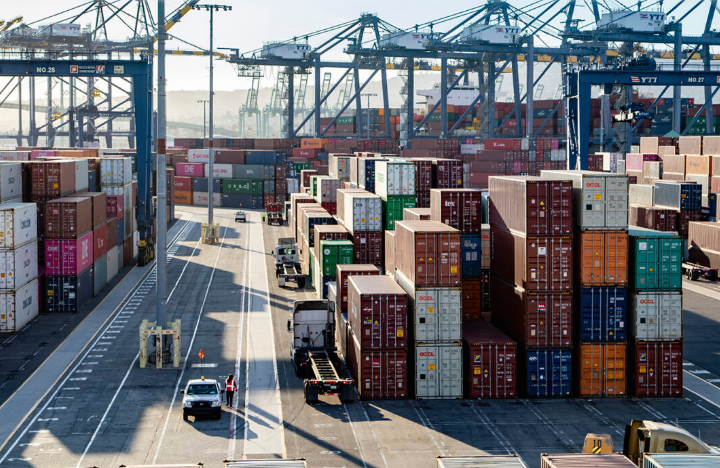
Transcribo el artículo de Agustín Montori ( Presidente de la Comisión Marítima de FETEIA-OLTRA ), que ilustra la grave situación que venimos sufriendo en el transporte marítimo, en los últimos meses, y que, según parece, va a durar algunos meses mas.
TRANSITARIOS EN UNA ENCRUCIJADA (…UNA MÁS)
La situación por la que atraviesa el transporte marítimo de contenedores es extremadamente compleja y en modo alguno favorable para los intereses de la carga. Nos encontramos, desde una perspectiva de empresas de servicios, ante unos proveedores del área marítima, los armadores, de los que entre diez de ellos, controlan el ochenta por ciento del volumen de estos servicios y, en consecuencia, controlan la oferta. Lo hacen con el permiso de las autoridades reguladoras en los ámbitos en donde estas ejercen sus funciones; en nuestro caso, en la UE, con el permiso de la Comisión Europea que ha concedido a las diferentes asociaciones de armadores que prestan servicios regulares en el tráfico marítimo de la UE, la exención del cumplimiento de las normas de la libre competencia contenidas en el artículo 101 del Tratado de funcionamiento de la Unión Europea, con el peregrino argumento de que “favorecen el desarrollo del comercio marítimo”.
De los diez “magníficos” citados anteriormente, varios de ellos de manera pública y decidida han optado por convertirse en “operadores integrales”, es decir , que no solo actúan en el puro transporte por mar, sino que también en las actividades que en la implementación de la cadena logística se desarrollan también en tierra: manipulación portuaria, llenado y vaciado de contenedores, transporte terrestre de contenedores, asumen en fin, en su totalidad, la función de operadores puerta a puerta forzando a sus usuarios a utilizar sistemas digitalizados de tratamiento de la información que ponen los datos de este totalmente en manos del citado proveedor.
¿Ha redundado esta situación en beneficio del comercio marítimo?
En absoluto. Los fletes hoy son doscientas y trescientas veces más caros que en 2019 . El incumplimiento de los programas de servicios (regularidad en las escalas) de los armadores es superior al 35 por ciento. La falta de contenedores en los puertos de carga es un problema que no se solucionará en la primera mitad de 2021.
Y.. ¿Qué podemos hacer los Transitarios?.
Pues sin ninguna duda, ponernos al lado del principal perjudicado que es nuestro cliente, la carga. Estamos asistiendo a foros públicos junto a asociaciones de cargadores, y con ellos, presionando a la UE para que actúe y acabe con esta situación que en la práctica es un oligopolio. Efectivamente, la carga no ha salido en absoluto beneficiada de esta situación. Los fletes son mas caros, los viajes se hacen más largos e inciertos y los costes se disparan. Los Transitarios, al lado de sus clientes sufren de igual manera estas circunstancias, con el agravante de que tienen que afrontar la competencia de unos proveedores que trabajan en régimen de cuasi oligopolio en el que estos enormes competidores pueden obviar las regulaciones de la libre competencia sin correr riesgos por la famosa exención ya citada.
Y seguir luchando junto a nuestros clientes dándoles el servicio, la gestión y la colaboración integral ante estos Leviatanes del transporte. Esa es nuestra mejor arma. Desplegar todas nuestras capacidades para que los usuarios se encuentren arropados en todo momento y con una gestión inteligente y clara de sus necesidades de transporte.
Debemos también de considerar que, todo y que esta situación acabará, como acabaron la famosas “Conferencias de fletes” que constituyeron otra situación de oligopolio encubierto por parte de los armadores, aún durará algún tiempo: Los Transitarios no nos vamos a oponer a las asociaciones de armadores, ni al desarrollo de servicios conjuntos por su parte. Si que actuaremos contra posiciones de dominio que trascienden la libre competencia y el libre mercado.
Y habremos de tomar las medidas adecuadas para garantizar nuestra supervivencia en un mercado global y digital. Adquirir las dimensiones adecuadas que mediante fusiones, adquisiciones e integración en redes globales nos dan la fortaleza necesaria para enfrentar esta competencia descarnada y, desde nuestro punto de vista, abusiva. Implementar las medidas tendentes a que nuestra actividad esté plenamente adaptada e integrada en las nuevas plataformas integrales sectoriales, institucionales (ventanilla única, cadenas de bloques…) que hagan nuestros servicios idóneos en el mercado.
Presidente de la Comisión Marítima de FETEIA-OLTRA
0 Comentarios
Dejar una respuesta
Debe de ingresar para publicar un comentario.



